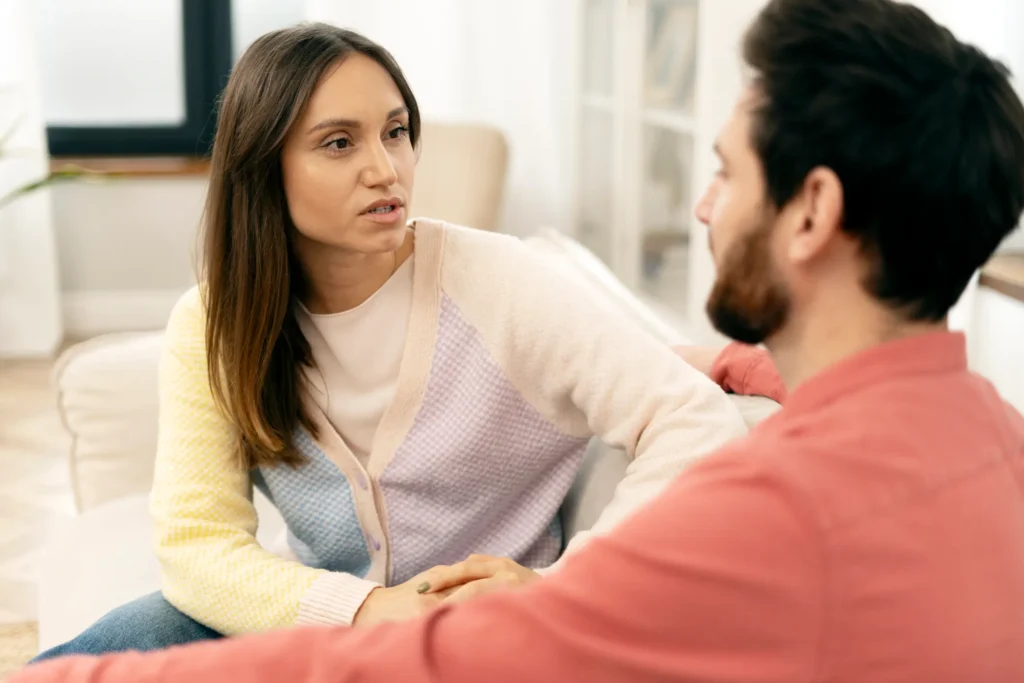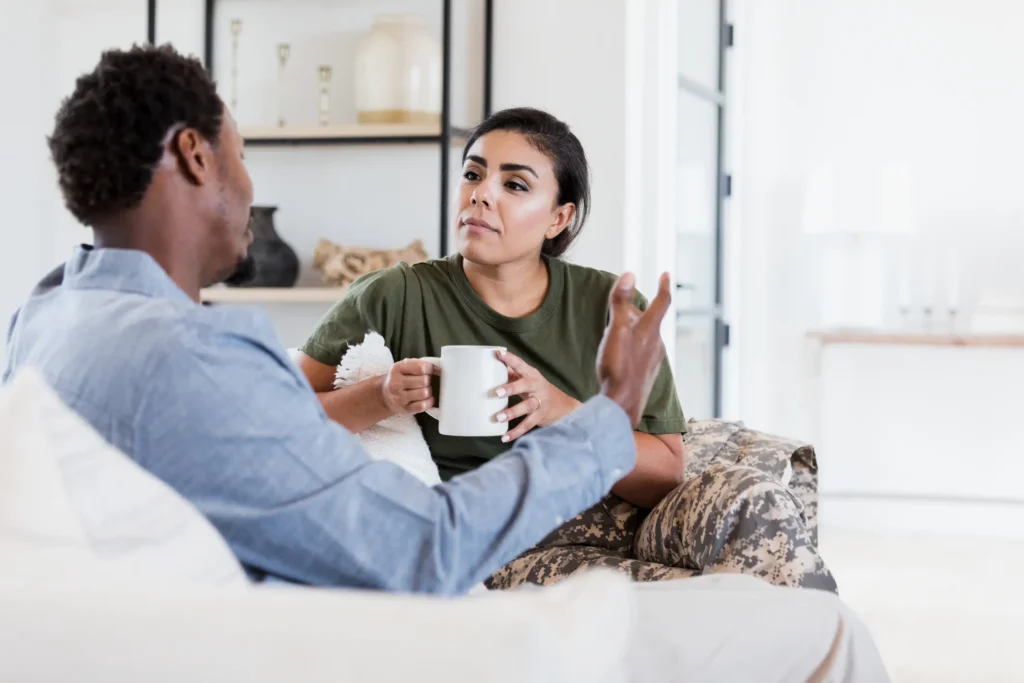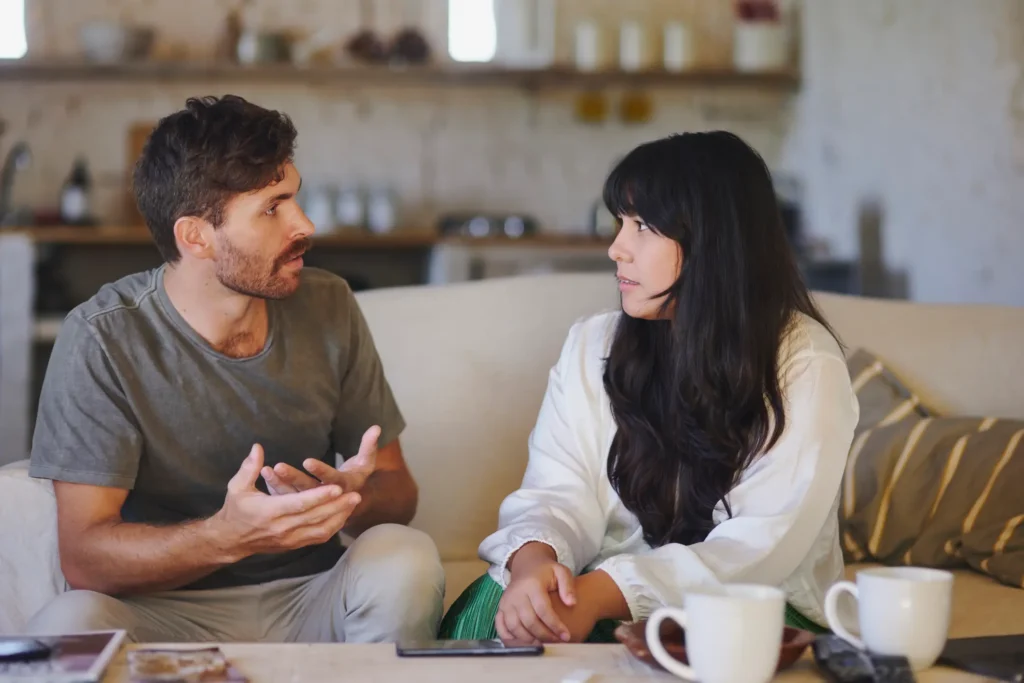Improving Communication: Tips to Enhance Your Relationship
Learn research-based strategies to enhance your daily interactions, fostering not just clearer conversation, but also a deeper bond. Integrating these small things into your routines can make every conversation with your partner an opportunity to reconnect, rekindle, and rediscover joy in your relationship.
Brief Overview
Learning how to communicate better with your partner can transform your relationship, creating a deeper emotional connection. It’s tough to navigate misunderstandings, but by embracing active listening, empathy, and patience, you’re not just exchanging words; you’re building a bridge of trust and love. Engaging in intentional conversations, with open-ended questions and attention to nonverbal cues, fosters an environment where both partners feel supported and valued. Each step towards better communication is a step towards a more loving, resilient partnership.
Key Highlights
- Recognizing common communication issues is essential to rebuilding any lost trust and to get through misunderstandings.
- Active listening involves understanding feelings and providing emotional support, enhancing relationship communication.
- Nonverbal cues play a role in conveying emotional support and understanding.
- Practicing empathy in conversations creates a safe space for expressing needs and enhancing emotional connection.
- Setting aside dedicated time for talking promotes love, respect, and deeper connection.
Understanding the Foundations of Communication
Improving communication with your partner can be challenging, yet it’s essential for a healthy emotional connection. Our research shows that establishing strong communication involves recognizing common problems and utilizing core skills and strategies to ensure both partners are getting their needs met.
Recognizing Common Communication Issues
Issues can arise from mismatched communication styles, leading to a cycle of misunderstandings and frustration. This in turn can lead to certain types of relationship dynamics. Dr. John Gottman characterizes the different types of couples as:
- Validating Couples
- They listen carefully to each other, show respect, and work toward compromise.
- Conflicts are calm and constructive, with lots of empathy and understanding.
- Volatile Couples
- They argue passionately and express emotions openly, both positive and negative.
- Disagreements can be intense, but they balance it with strong affection, humor, and connection.
- Conflict-Avoiding Couples
- They avoid disagreements and emphasize common ground.
- Harmony and acceptance are prioritized over resolution, and they agree to disagree.
- Hostile Couples
- Characterized by criticism, defensiveness, and contempt during conflicts.
- They are frequently negative toward each other, with little positive balance.
- Hostile-Detached Couples
- Their conflicts are marked by coldness, emotional distance, and withdrawal.
- There’s little warmth or engagement, and negativity dominates with minimal repair attempts.
The first three (Validating, Volatile, Conflict-Avoiding) can still be stable and happy if the positive-to-negative ratio of interactions remains high. The last two (Hostile, Hostile-Detached) are typically unstable and at high risk for divorce.
Addressing communication style differences and the dynamics they create requires patience and transparency. It is important that both partners feel supported and encouraged to express their perspectives. By understanding these dynamics, you can foster a healthier dialogue within your relationship. Learning how to communicate better with your partner isn’t a solitary effort but a mutual commitment. It’s about moving forward hand in hand, learning, and growing together.
Building a Compassionate Connection with Your Partner
Creating a compassionate connection with your partner is about more than just words; it’s about feeling seen, heard, and valued. This journey involves embracing empathy and practicing patience, key components in learning how to communicate better with your partner.
Practicing Empathy in Conversations
Empathy is connecting to another person’s feelings by seeing things from their perspective, staying out of judgment, and letting them know they’re not alone. It’s less about fixing and more about being present and saying, “I’m with you.” The power that empathy has is rooted in this emotional connection.
Empathy requires an active effort to understand your partner’s emotions and perspectives. Imagine your partner discussing a difficult day at work; instead of offering immediate solutions, empathizing with their feelings shows that you care deeply about their experience. It’s about connecting emotionally, acknowledging their feelings, and supporting them with compassion. Our research shows that when partners feel empathetically validated, they experience a stronger emotional connection that fortifies their bond. It involves quieting your mind to focus entirely on your partner’s emotional wellbeing. It strengthens the foundation of your relationship, encouraging deeper communication and fostering trust.
The Role of Patience and Understanding
It can be difficult to have patience in the midst of life’s stressors when emotions are running high in a relationship. Yet, patience and understanding play vital roles in learning how to communicate better with your partner. They transform arguments into discussions, creating an environment where both voices feel respected and heard. This means letting go of the need to respond or convince or impose our emotional narratives on our partner. Partners often struggle because they react rather than respond. Reacting can shut down communication, but a patient response can give your partner the time and space to express their thoughts without interruption or prejudice. It’s about learning to coexist with differing perspectives without the need to assert dominance.
Strategies for Improving Communication
Learning how to communicate better with your partner can transform the very fabric of intimacy and understanding within a relationship. It’s not just about talking; it’s about cultivating a space where both individuals feel heard and understood. This section delves into crucial strategies like asking open-ended questions and decoding nonverbal cues. Mastering these skills can lead to a deeper emotional connection, bringing warmth and confidence to your partnership.
Foundation of Friendship
It is important to have a detailed understanding of your partner’s inner world—their hopes, worries, values, daily routines, and life story. This changes over time so it is something that needs to be updated on a regular basis. Dr. Gottman calls these Love Maps, and the importance lies in how they keep partners emotionally connected even as life changes. When you know each other deeply, you’re more likely to notice shifts in mood, anticipate needs, and offer meaningful support. Couples with strong Love Maps have greater resilience, because they feel truly known and understood.
Rituals of Connection
These are intentional habits or traditions that create consistent moments of closeness. These can be small, everyday rituals like sharing a morning check-in, or larger traditions such as family dinners or holiday celebrations. Their importance is that they build a sense of reliability and shared meaning. In busy or stressful seasons, these rituals anchor couples in a rhythm of connection, reminding each partner they are prioritized and cherished.
Stress-Reducing Conversation
This a conversation where both partners talk about external pressures—like work or family—without trying to “fix” them, but instead listening, validating, and empathizing. Its importance is that it transforms stress from something isolating into something bonding. By providing emotional safety, couples strengthen trust and show they are allies against outside challenges. Over time, this habit protects the relationship from being eroded by life’s unavoidable stressors.
Asking Open-Ended Questions
These questions, unlike their yes-or-no counterparts, invite your partner to share more deeply, allowing for a richer emotional exchange. For example, instead of asking, “Did you have a good day?”, you might say, “What made you smile today?” This small shift requires your partner to reflect and share insights, fostering a sense of warmth and intimacy that goes beyond superficial interactions. Open-ended questions invite your partner to share thoughts and feelings that might otherwise remain unspoken, leading to a healthier relationship dynamic.
The Importance of Active Listening
Active listening in relationships isn’t just hearing words; it’s understanding feelings and providing the emotional support your partner needs. This skill is foundational for healthy communication and can significantly deepen your connection. In many relationships, we’re often quick to talk but slower to listen. Reacting with understanding rather than rushing to respond can greatly enhance communication. Active listening demands full attention. This involves maintaining eye contact, nodding affirmatively, and occasionally reiterating your partner’s points to show you’re engaged. When partners feel genuinely heard, they’re more likely to reciprocate, creating a cycle of positivity and support.
Nonverbal Communication: What You Might Be Missing
Nonverbal communication plays a vital role in healthy relationships, and when used intentionally can strengthen connection. By becoming more aware of your partner’s body language, tone, and facial expressions, you can better recognize their emotional needs. Turning toward even small nonverbal bids for connection—like a smile, sigh, or touch—helps build trust and intimacy. Maintaining soft tones, open posture, and eye contact can reduce defensiveness, while repair attempts such as humor or a gentle touch can de-escalate conflict. Finally, monitoring your own nonverbal signals—especially avoiding contemptuous gestures like eye-rolling—supports emotional attunement and long-term relationship stability.
Creating a Supportive Environment for Growth
Building a truly supportive environment for growth with your partner requires intentional efforts in communication. By learning to set aside dedicated time to talk, you can ensure that communication isn’t purely transactional but also includes times for deeper connection and support.
Setting Aside Time to Talk in Your Relationship
We often find ourselves entangled in the hustle and bustle of daily life, which can make it challenging to truly connect with the person we love. This disconnection can lead to misunderstandings or feelings of neglect. It’s vital, therefore, to consciously set aside time to communicate. This may seem like a small step, but our research shows that maintaining dedicated time to talk can substantially enhance the emotional landscape of a partnership.
Consistency is key. The habitual nature of these dedicated moments ensures ongoing emotional and relational support, making it easier to address issues as they arise. When both partners know they have a dedicated time for genuine communication, it reduces stress and fosters a thriving environment for growth. This practice isn’t just about talking, it’s about deepening your emotional connection.
Learning how to communicate better with your partner is a journey worth embarking on, it can deepen your connection and brighten your shared future. By committing to honest dialogues, active listening, and empathy, you’re stepping towards a more fulfilling relationship. Remember, it’s about progress, not perfection. Every little effort counts and can lead to significant transformations. The conversations you share today lay the foundation for a stronger relationship tomorrow.








